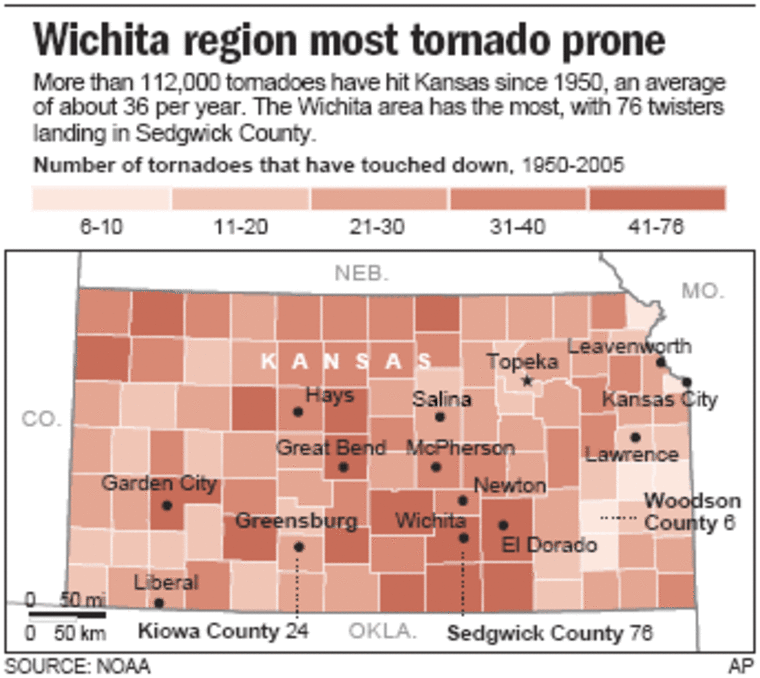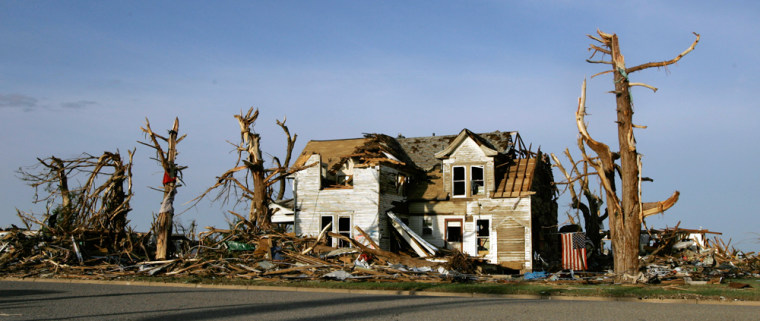The death toll from one of the strongest tornadoes to hit the U.S. in the past eight years climbed to 10 on Tuesday when a critically injured police officer from a nearby town was removed from life support.
Robert Tim Buckman, a 46-year-old officer from Maxville, received a head injury in Friday’s storm that left nine others dead in Greensburg, officials said. Buckman was taken to a Wichita hospital, where he was declared dead shortly before 8 a.m. Tuesday, his son, Derick Buckman, told The Associated Press.
“He died being a hero,” said Derick Buckman. “He was sworn to protect people and that’s what he was doing the night he got picked up by a tornado.”
Search and rescue operations were continuing Tuesday in Greensburg, where emergency responders have struggled to find out how many of its 1,600 residents may be safely staying with friends or relatives, rather than in shelters.
President Bush was to tour the damage on Wednesday.
The 1.7-mile-wide Category EF-5 tornado, with wind estimated at 205 mph, destroyed about 95 percent of this farming town Friday.
(Tornadoes are usually categorized by wind speed based on the Fujita Tornado Intensity Scale, with F-5 referring to the most powerful storms. The "EF," or "Enhanced Fujita" scale, measures the severity of a tornado based on damage rather than wind speed.)
The massive tornado was part of a weekend of violent storms that tore across the Plains and were also blamed for two other deaths elsewhere in Kansas.
Early warning system hailed
The death toll in Greensburg could have been much worse, but for a 20-minute warning — a rarely issued “tornado emergency” alert — that gave people time to take shelter in basements and storm cellars.
“When you look around at the devastation here, it is amazing that there aren’t more deaths,” said Sharon Watson, a spokeswoman for the Kansas Division of Emergency Management. “You really can’t look in any direction without seeing destruction, without seeing houses that are demolished, piles of rubble.”
The last day anyone was found alive was early Saturday morning, when two elderly women were pulled from the wreckage of a Mennonite church.
Five trailers to house displaced families have arrived, and 20 more are on the way, said FEMA Director R. David Paulison, who toured the town by bus on Monday.
The government’s response to the disaster was undermined by ongoing National Guard deployments to the Middle East, Gov. Kathleen Sebelius said.
‘Recovery will be at a slower pace’
“I don’t think there is any question if you are missing trucks, Humvees and helicopters that the response is going to be slower,” Sebelius said. “The real victims here will be the residents of Greensburg, because the recovery will be at a slower pace.”
White House spokesman Tony Snow rejected the criticism, saying the National Guard had equipment positioned around the country to respond to disasters when requested by states.
The names of five other victims were released Monday: Claude Hopkins, 79; Larry Hoskins, 51; David Lyon, 48; Colleen Panzer, 77; and Ron Rediger, 57. All were from Greensburg.
The weekend storms continued their misery across parts of the Plains. One man drowned Monday in western Oklahoma when a flood swept his vehicle off a rural road, authorities said.

‘All we can do is wait’
In southwest Iowa, nearly 1,600 residents of Red Oak and all of tiny Coburg were urged to evacuate Monday as the East Nishnabotna River and a creek rose out of their banks.
Flooding in Kansas along the Wakarusa River cut off its namesake community south of Topeka. Residents used boats to rescue 22 people from their homes in the small town, said Willie Peterman, a district chief for an area fire department.
In Rossville, northwest of Topeka, Dennis Hall was busy placing sandbags around his split-level ranch home.
“All we can do is wait,” Hall said. “We just don’t need any more rain.”
